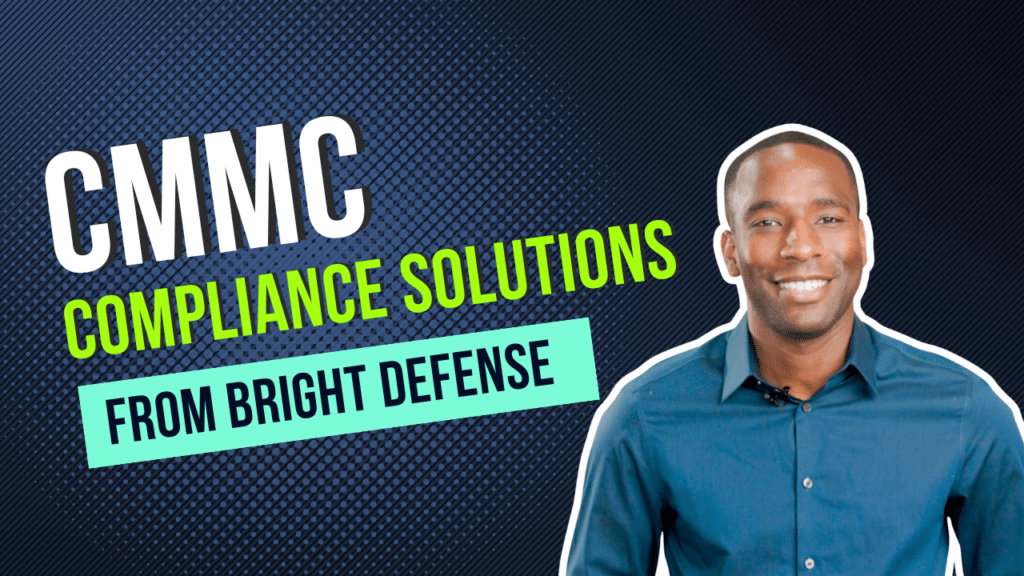
John Minnix
March 19, 2025
Strengthening Your Business with Cybersecurity Compliance: A Key to Trust and Growth
October is Cybersecurity Awareness Month, a time dedicated to educating businesses about the importance of protecting their digital assets. For small to medium businesses, achieving cybersecurity compliance isn’t just a regulatory checkbox. It’s a crucial step toward enhancing your security posture and earning customer trust.
Why Compliance Matters for Small to Medium Businesses
In today’s digital landscape, cyber threats are constantly evolving. For small and medium businesses, non-compliance with industry standards can lead to severe consequences. These include data breaches, hefty fines, and reputational damage that could take years to repair. But it’s not all about avoiding risks. Compliance can also open doors to new opportunities. This helps you build stronger relationships with clients and partners who value data security.
Key Compliance Standards to Consider
At Bright Defense, we specialize in guiding businesses through the complexities of various compliance frameworks. Each standard is designed to address specific security needs and regulatory requirements. Here’s a closer look at the frameworks we focus on:
SOC 2 (Service Organization Control 2)
- Purpose: SOC 2 is a framework developed by the American Institute of Certified Public Accountants (AICPA). It ensures service providers manage customer data securely, protecting the privacy and confidentiality of that information.
- Core Principles: It revolves around five trust service criteria—Security, Availability, Processing Integrity, Confidentiality, and Privacy.
- Applicability: SOC 2 is essential for companies that handle sensitive customer data. This is particularly true in technology, SaaS, and cloud-based services.
- Benefits: Achieving SOC 2 compliance demonstrates your commitment to data security. This can enhance customer confidence and set you apart from competitors.
ISO 27001
- Purpose: ISO 27001 is an internationally recognized standard that provides a systematic approach to managing sensitive company information through an Information Security Management System (ISMS).
- Risk-Based Framework: It focuses on identifying, assessing, and managing risks to the confidentiality, integrity, and availability of information.
- Applicability: Suitable for organizations of all sizes and industries, ISO 27001 is especially valuable for businesses looking to establish a comprehensive and proactive approach to data security.
- Benefits: Achieving ISO 27001 certification can help you minimize risks, comply with legal and regulatory requirements, and gain a competitive advantage in the global marketplace.
HIPAA (Health Insurance Portability and Accountability Act)
- Purpose: HIPAA is a U.S. regulation designed to protect sensitive patient health information (PHI) from being disclosed without the patient’s consent or knowledge.
- Compliance Requirements: Organizations must implement administrative, physical, and technical safeguards to ensure the confidentiality, integrity, and availability of PHI.
- Applicability: HIPAA compliance is mandatory for healthcare providers, insurers, and any business that handles or processes PHI, including IT service providers and third-party vendors.
- Benefits: Complying with HIPAA not only avoids hefty fines but also enhances patient trust by demonstrating your dedication to protecting their sensitive health information.
CMMC (Cybersecurity Maturity Model Certification)
- Purpose: CMMC is a cybersecurity framework created by the Department of Defense (DoD) to protect the Defense Industrial Base (DIB) from cyber threats by enforcing a baseline of cybersecurity practices.
- Maturity Levels: It consists of three maturity levels, ranging from basic cyber hygiene to advanced practices, ensuring that businesses implement appropriate security controls.
- Applicability: CMMC will soon be required for any company in the defense supply chain that handles Controlled Unclassified Information (CUI) or Federal Contract Information (FCI).
- Benefits: Achieving CMMC compliance is not just about eligibility for defense contracts. It also positions your company as a trusted partner in the federal marketplace.
PCI-DSS (Payment Card Industry Data Security Standard)
- Purpose: PCI-DSS is a global security standard that secures credit card transactions and protects cardholder data from theft and misuse.
- Core Requirements: It includes guidelines for building and maintaining secure networks, protecting cardholder data, managing vulnerabilities, implementing access controls, and monitoring systems.
- Applicability: Any organization that accepts, processes, stores, or transmits credit card information must comply with PCI-DSS, regardless of its size or the volume of transactions.
- Benefits: Compliance with PCI-DSS not only reduces the risk of data breaches but also helps avoid significant financial penalties and preserves your brand’s reputation in the marketplace.
Understanding and implementing these compliance standards is crucial to protecting your data and maintaining your clients’ trust. Bright Defense is here to guide your business through these frameworks, ensuring that you achieve and maintain compliance efficiently and effectively.
Practical Tips for Strengthening Your Compliance Efforts
Achieving cybersecurity compliance is not a one-time event—it’s an ongoing commitment that requires regular attention and proactive strategies. Here are some comprehensive steps your business can take to ensure your compliance efforts are both effective and sustainable:
Develop and Regularly Update Security Policies
Documented Standards: Clearly outline your organization’s security policies and procedures, ensuring they align with industry standards like SOC 2, ISO 27001, HIPAA, and CMMC. These standards should serve as the foundation of your data protection strategies.
Scheduled Reviews: Conduct regular policy reviews at least annually or whenever significant changes occur in your business operations or the threat landscape. This practice ensures that your policies remain relevant and effective against evolving risks.
Adaptability: Ensure your policies are flexible enough to adapt to new regulatory requirements or emerging security threats. Your ability to quickly adjust to changes is crucial for maintaining a strong security posture.
Conduct Thorough Internal Audits and Assessments
Gap Analysis: Perform a gap analysis to identify discrepancies between your current security posture and the required standards. This step helps you focus your resources on the areas where they are most needed to achieve compliance.
Vulnerability Scanning: Regularly scan your systems and networks for vulnerabilities using both automated tools and manual assessments. This dual approach helps you catch weak points before attackers exploit them.
Penetration Testing: Conduct periodic penetration tests to simulate cyberattacks and assess how well your defenses hold up under pressure. Bright Defense offers tiered penetration testing services—Ignite, Elevate, and Summit—tailored to meet the needs of businesses at different growth stages.
Invest in Comprehensive Employee Training Programs
Security Awareness Training: Equip your employees with the knowledge to recognize and respond to common cyber threats. These include phishing attacks, social engineering tactics, and data breaches. Awareness is the first line of defense against many cyber risks.
Role-Based Training: Customize training programs to match the specific responsibilities of different team members. Focusing on their unique roles ensures they are prepared for the security challenges they are most likely to face.
Regular Refreshers: Schedule ongoing training sessions to keep your team updated on the latest compliance requirements and threat trends. Regular refreshers help ingrain security awareness into your company culture, reducing the risk of human error.
Implement Continuous Compliance Monitoring
Real-Time Alerts: Use monitoring tools that provide real-time alerts for any suspicious activities or non-compliant actions within your systems. Immediate notifications allow you to respond to potential threats before they escalate.
Automated Reporting: Leverage automated tools to generate compliance reports that can be easily reviewed by your team and presented to stakeholders or auditors. This streamlines the reporting process and ensures transparency.
Adapt and Evolve: Treat compliance as a dynamic process that evolves with your business. Regularly assess your monitoring efforts to stay aligned with new security standards and to address emerging threats proactively.
Establish a Strong Incident Response Plan
Defined Procedures: Develop a clear incident response plan that outlines the steps your team should take in the event of a data breach or security incident. A well-defined plan minimizes confusion and enables swift action.
Rapid Response: Ensure your incident response plan prioritizes rapid detection and containment of incidents to limit the impact on your business operations and data security.
Post-Incident Analysis: Conduct a thorough review after each incident to identify root causes and implement measures that prevent similar issues in the future. Continuous improvement of your response strategy strengthens your overall security resilience.
These practical steps will help your business not only achieve but also maintain a strong compliance posture. By being proactive and disciplined in your approach, you can reduce risks, protect your data, and build a reputation as a secure and trustworthy organization.
How Bright Defense Simplifies the Compliance Journey
Achieving and maintaining compliance can be overwhelming, but Bright Defense is here to make it easier. Our tailored Continuous Compliance Plans—Sentry, Guardian, and Defender—meet the needs of businesses at any stage, from startups establishing their security foundations to established companies seeking advanced protection.
We provide expert support and tools to help you navigate the compliance process and continuously monitor and adapt to evolving security requirements. Contact us today to schedule your free consultation. Let Bright Defense create a tailored compliance strategy that fits your business needs. With Bright Defense by your side, achieving and maintaining compliance has never been easier or more effective. Together, we’ll safeguard your organization’s future.
Get In Touch



